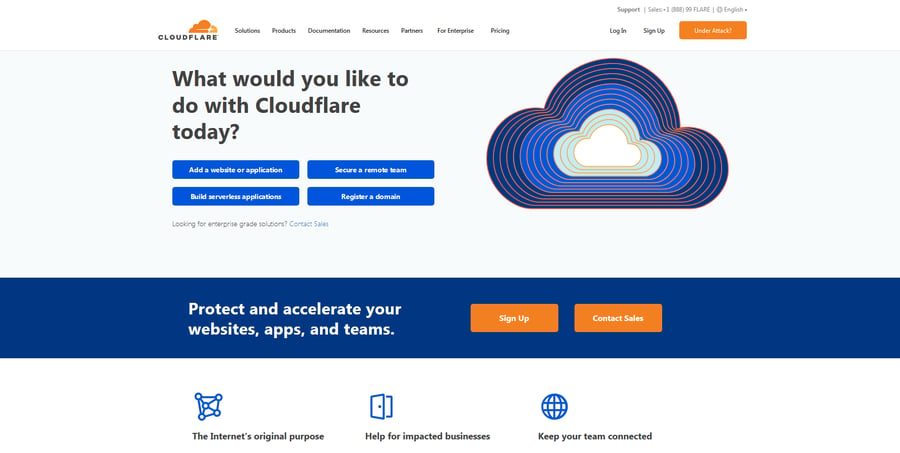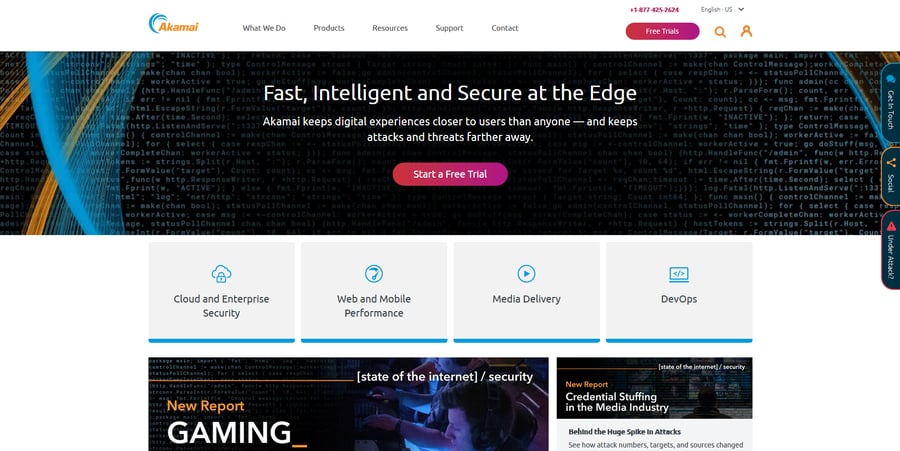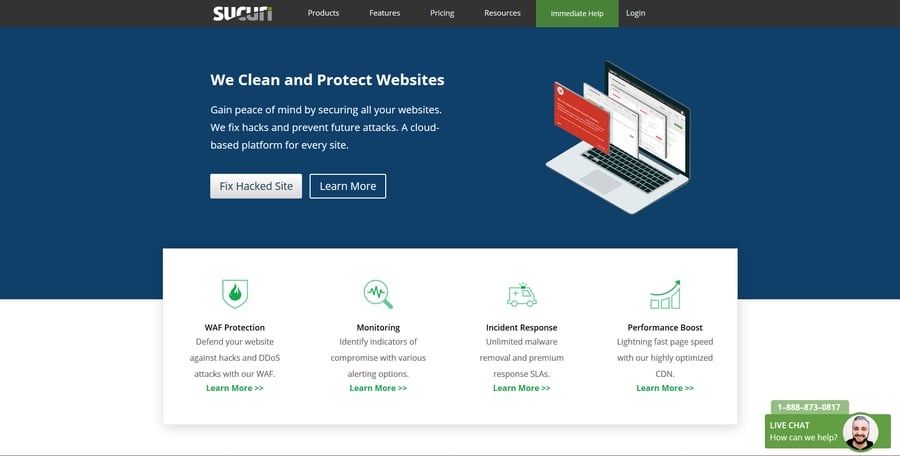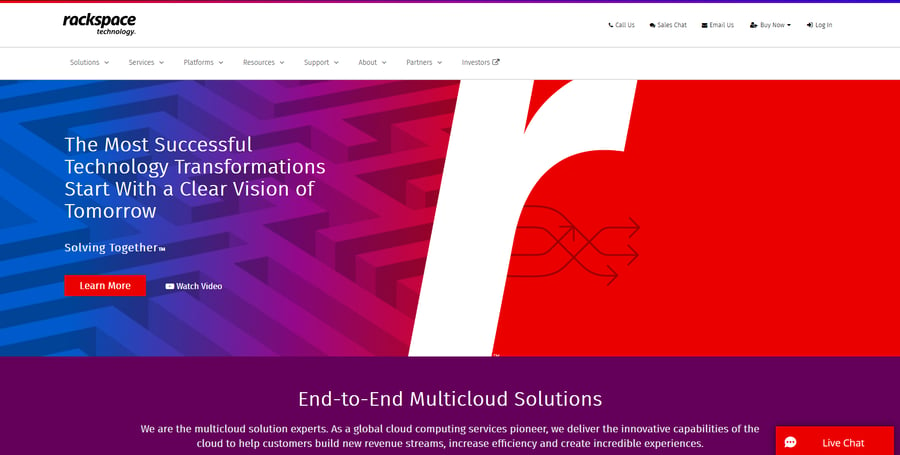
Does your eCommerce website load quickly? Or do customers need to wait?
What if your website falls victim to an attack? Does everything grind to a halt?
Denial of service attacks can overwhelm a website by sending a flood of traffic. If your store becomes overrun, it could easily crash.
The answer to these speed and security issues? Content delivery networks or CDNs.
This article examines the best CDN solutions and how they can help your eCommerce site.
You'll learn what a CDN service is. Why a CDN is important for faster loading times. And how a CDN can protect you from DDoS attacks.
At the end of the article, we provide a list of the top CDN providers. So, read on to see who offers the best in website speed and website protection.
What Is a CDN Service?
The traditional way to host a website was to hold all the files on one server.
eCommerce stores often used virtual private servers or dedicated hosting options to hold content. Visitors would arrive on the site and the server would build the pages using images and files stored on the local machine.
The big problem with a single server was speed.
When the website attracted more traffic, extra strain was put on the machine. And it couldn't cope.
Adding to the cart took forever as thousands of people tried to buy at the same time. If traffic came from the other side of the world, images loaded at a snail's pace.
Google's research shows that as page time increases so does the bounce rate. Google also uses loading times to rank a webpage in its results. So, faster pages get more customers and rank higher.
A new solution needed to address these issues. Something that could scale and handle high numbers of simultaneous requests.
Content Delivery Network Solutions
To help improve a website's speed, many online stores now turn to a Content Delivery Network or CDN.
CDNs are a distributed network of servers spread across the world. Their purpose is to hold, share, and provide faster content delivery.
Instead of putting all your eggs in one basket, a CDN replicates the likes of images and JavaScript files throughout their network. These data centers or points of presence send files that are geographically closest to your customers.
Why a CDN Is Important for Your Business Website
If your website sells across the globe or if your current web host needs help improving loading times, it's time for a CDN. Consider this scenario:
A shopper from the UK accesses your US eCommerce site. Instead of sending the files across the Pond, the CDN displays images hosted in their London data center.
Images load more quickly which results in better user experience. Google picks up on that too and rewards your site for faster loading times.
Therefore, CDNs remove bottlenecks by spreading the load. But they also help mobile users.
CDNs and Mobile Traffic
Over half of all Internet traffic now comes from mobile devices.
Mobile searching has outgrown desktop searches. And Google's mobile-first indexing will only increase its importance in the future.
Content delivery networks help boost mobile access by providing optimized files.
Even a 250-millisecond difference in page load can bring a huge advantage. That's something CDNs were designed to do.
Benefits of CDNs
We've looked at the speed of delivery due to files being closer to a visitor as a major benefit of CDNs. But they offer a lot more advantages including:
- Lower Network Congestion
Simply put, the bottleneck issue gets resolved by using a CDN.
Your visitors automatically get redirected to other servers when traffic gets too high. The transition is seamless too. No having to click a link to use a faster service.
- Lower Bandwidth Costs
A CDN sits between your website server and your customer. When a visitor opens your product page, the CDN shows its copy of the images instead of your site's.
This has an impact on how much your host charges for bandwidth, or the amount of information it serves.
Because CDNs hold static or cached versions of your files, your hosting server doesn't need to send them over and over. The CDN does that. And they charge a lot less than a typical web site host.
Prices range from $0.01 to $0.40 per GB depending on the CDN provider. Compare that to your current host's plan and you'll see a huge difference for large volumes of data transfer.
- Data Analytics
Everything that's downloaded or updated gets logged. And you get full access to those analytics reports.
It's great to be able to see what resources are being used most often. For example, a tutorial video that sees a surge in views needs to be placed beside a product promotion.
- Protection against DDoS Attacks
So far, this article has concentrated on the speed advantages CDNs can bring. Yet they also offer major security benefits, especially against DDoS attacks.
The next section explains what a DDoS attack is and how a Cloud-based CDN service can protect your online store.
What Is a DDoS Attack?
DDoS or Distributed Denial of Service attacks sees your website becoming overwhelmed by fake visitors.
The goal is to disrupt, not to steal or break into your hosting server. Too much traffic can cause a severe bottleneck which jams the system. And it can even crash your site.
Why would anyone do such a thing?
It boils down to two main reasons: controversy and cash.
Hackers who want to disrupt an online service use botnets or computers under their control. Some have a political agenda while others do it just for kicks. But others get paid to bring a site to its knees.
If your site is in a highly competitive market don't be surprised to become a target of a DDoS attack. The hacker's aim is to drive traffic to their sponsor, usually one of your competitors.
Why a Cloud-Based CDN Service Can Protect from DDoS
Protecting your website from DDoS-style attempts is core to the best CDN solutions.
A content delivery network mitigates or lessens the chances of a DDoS attack by using its large size as an advantage.
Top CDN Cloudflare has data centers in 200 cities with a network capacity of 42 Tbps. When an attack occurs, its systems work together to identify and mitigate it within 3 seconds.
There's no comparing a single website host to cloud-based CDN providers. CDNs are geared for this type of threat and manage them every day.
Best CDN Solutions
We've gathered a list of the best CDN providers below to help you choose the right service.
Each offers a unique blend of speed and protection. Depending on the package you choose, you'll also get automatic mobile optimization and lossless images.
1. Cloudflare
 Cloudflare was consistently voted the top CDN provider throughout 2020.
Cloudflare was consistently voted the top CDN provider throughout 2020.
It's free for individual users but Pro plans start at only $20 per month. For that you get:
- Global CDN - 9-millisecond requests compared to 31 MS average
- DDoS mitigation - blocks an average of 72 billion threats each day
- Cloudflare Workers - less code with automatic scaling
- No extra bandwidth charges
The dashboard is intuitive and easy to use. You have access to lots of analytics reports. And you can view and edit threat controls.
The downside of using Cloudflare comes in its customer support.
Support requests are handled via email unless you upgrade your account for year-round chat access. However, the service is barely down as it boasts great uptime stats.
If you're using Shift4Shop, though, you don't have to worry about any of this. We include Cloudflare CDN for free on every Shift4Shop store, as part of our service. If something goes wrong, we're already talking to Cloudflare about it for you.
You get all those benefits with none of the downsides.
2. Akamai
 Many of the big-name websites like LinkedIn and Twitter use Akamai as their CDN provider.
Many of the big-name websites like LinkedIn and Twitter use Akamai as their CDN provider.
The name means witty in Hawaiian, but its global network is nothing to laugh at. They have 1000 points of presence in the US alone!
Ion is Akamai's performance solution that uses AI to optimize and control content. It provides the best web and app experiences by continuously monitoring user behavior. This happens in real time, so content gets delivered at the optimum rate.
As you can imagine this service isn't for all business sizes or budgets.
Prices are customized depending on your requirements. If you need to host a scalable site with a high traffic count, then Akamai could be your best choice.
3. Sucuri
 Sucuri's aim is to "clean and protect websites."
Sucuri's aim is to "clean and protect websites."
Their focus is on security and they help by defending your website against hacks and DDoS attacks. The Web Application Firewall (WAF) protects against malware and brute force attacks too.
Sucuri's global CDN delivery system can boost a website's performance by up to 70%. There are multiple cache options available. And their uptime levels are excellent.
The best benefit is the price.
The Pro plan is $299.99 a year which works out at $24.99 p/m. There's also a 30-day money-back guarantee.
4. Rackspace
 Rackspace has over 20 years of experience in hosting eCommerce websites.
Rackspace has over 20 years of experience in hosting eCommerce websites.
Their CDN offers excellent website speed improvements through 200 edge locations worldwide. It uses Akamai's network but at a lower cost.
Bandwidth charges begin at $0.1141 per Gigabyte for US traffic which drops to $0.0244 based on usage. Request fees are $0.00815 per 10k requests and are collated daily.
Speed and Security with a CDN Provider
This article has highlighted the benefits a content delivery network can bring to your online business.
CDNs make your site load faster no matter where in the world your customers visit from. They use their capacity to offer the ultimate protection against DDoS attacks. And the best CDN solutions offer analytics so you can see exactly how your site has performed.
But there's more to know about protecting your online business. Check out our article on web security best practices for eCommerce if you'd like to learn more.





Leave a reply or comment below